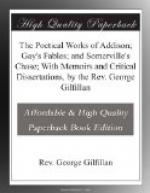To recur to the life of our poet. Losing his situation under the Duchess of Monmouth, he was patronised by the Earls of Oxford and Bolingbroke, and through them was appointed secretary to the Earl of Clarendon, who was going to Hanover as ambassador to that court. He was at this time so poor that, in order to equip himself with necessaries, such as shoes, stockings, and linen for the journey, he had to receive an advance of L100 from the treasury at Hanover. The Electoral Princess, afterwards Queen Caroline—wife of George II.—took some notice of Gay, and asked for a volume of his “Poems,” when, as Arbuthnot remarks, “like a true poet,” he was compelled to own that he had no copy in his possession. We suspect few poets, whether true or pretended, in our age would in this point resemble Gay.
Lord Clarendon’s embassy lasted precisely fifteen days—Queen Anne having died in the meantime—and the Tory Government being consequently dismissed in disgrace. Poor Gay, who had offended the Whigs by dedicating his “Shepherd’s Week” to Bolingbroke, came home in a worse plight than before. He had left England in a state of poverty—he returned to it in a state of proscription—although he perhaps felt comforted by an epistle of welcome from Pope, which did not, it is likely, affect him as it does us with the notion that its tricksy author was laughing in his sleeve.
Arbuthnot, who was a wiser friend, advised Gay to write an “Epistle on the Arrival of the Princess of Wales,” which he did, and she and her lord were so far conciliated as to attend a play he now produced, entitled “What d’ye call it?”—a kind of hybrid between a farce and a tragedy—which, by the well-managed equivoque of its purpose, hit the house between wind and water; and not knowing “what” properly to “call it,” and whether it should be applauded or damned, they gave the benefit of their doubts to the author. To its success, doubtless too, the presence and praise of the Prince and the Princess contributed. Gay now tried for a while the trade of a courtier—sooth to say, with little success. He was for this at once too sanguine and too simple. Pope said, with his usual civil sneer, in a letter to Swift, “the Doctor (Arbuthnot) goes to cards—Gay to court; the one loses money, the other time.” It added to his chagrin, that having, in conjunction with Pope and Arbuthnot, produced, in 1717, a comedy, entitled “Three Months after Marriage,” to satirise Dr Woodward, then famous as a fossilist; the piece, being personal and indecent, was not only hissed but hooted off the stage. The chief offence was taken at the introduction of a mummy and a crocodile on the stage. To divert his grief, he, at the suggestion of Lord Burlington, who paid his expenses, rambled into Devonshire, went next with Pultney to Aix, in France, and when afterwards on a visit to Lord Harcourt’s seat, witnessed the incident of the two country lovers killed by lightning in each other’s arms, to which Pope alludes in one of his letters, and Goldsmith in his “Vicar of Wakefield.”




